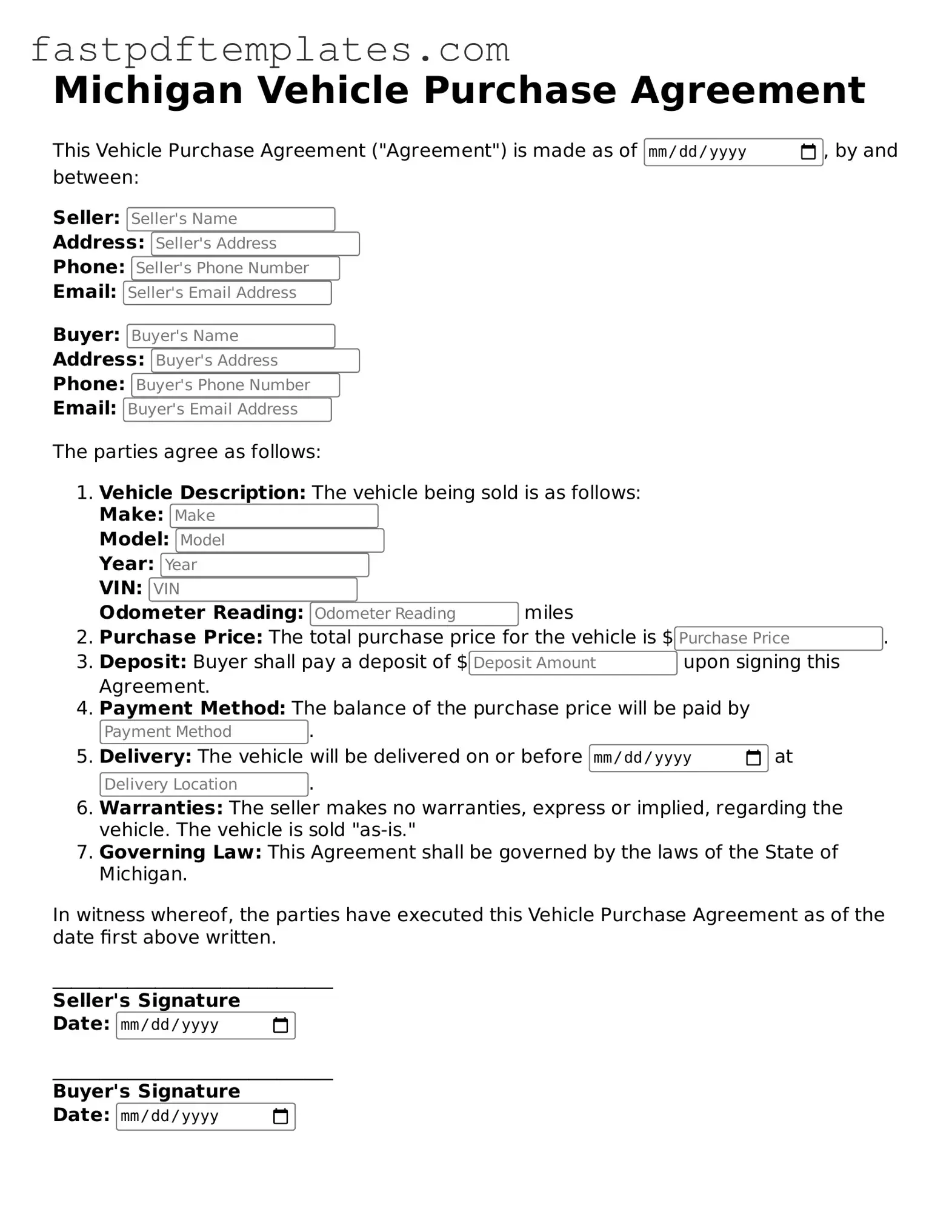The Bill of Sale is a document that serves as proof of the transfer of ownership of a vehicle from the seller to the buyer. Similar to the Michigan Vehicle Purchase Agreement, it contains essential details such as the names of both parties, the vehicle identification number (VIN), and the sale price. The Bill of Sale may also include information about any warranties or conditions related to the sale, ensuring that both parties are aware of their rights and obligations during the transaction.
The Purchase Order is another document that shares similarities with the Michigan Vehicle Purchase Agreement. It is used primarily in commercial transactions and outlines the specifics of a purchase, including the item being bought, the price, and terms of delivery. Like the Vehicle Purchase Agreement, a Purchase Order serves as a formal agreement between the buyer and seller, detailing the expectations and responsibilities of both parties throughout the transaction process.
The Lease Agreement is a document that outlines the terms under which a vehicle can be rented or leased. While the Vehicle Purchase Agreement focuses on the outright sale of a vehicle, a Lease Agreement specifies the rental period, payment amounts, and conditions for returning the vehicle. Both documents require clear identification of the vehicle and the parties involved, ensuring that all terms are mutually understood and agreed upon.
The Financing Agreement is similar to the Vehicle Purchase Agreement in that it outlines the terms of payment for a vehicle. This document details the loan amount, interest rate, payment schedule, and any collateral involved. Both agreements ensure that the buyer understands their financial obligations, although the Financing Agreement specifically addresses the borrowing aspect of the purchase, while the Vehicle Purchase Agreement confirms the sale itself.
The Title Transfer Document is crucial in the vehicle sales process, as it officially transfers ownership from the seller to the buyer. This document is similar to the Michigan Vehicle Purchase Agreement in that it requires both parties to provide their signatures. It also includes important vehicle details, such as the VIN and odometer reading, ensuring that the new owner has legal proof of ownership following the transaction.
The Warranty Document outlines any guarantees or protections offered by the seller regarding the vehicle's condition. Like the Vehicle Purchase Agreement, it serves to protect the buyer by detailing what is covered and for how long. Both documents require clarity in terms of expectations, ensuring that the buyer is aware of any limitations or conditions related to the vehicle's performance post-purchase.
The Odometer Disclosure Statement is a document that provides information about the vehicle's mileage at the time of sale. Similar to the Michigan Vehicle Purchase Agreement, it is essential for preventing fraud and ensuring transparency between the buyer and seller. Both documents require accurate information to be provided, as discrepancies in mileage can affect the vehicle's value and the buyer's decision-making process.
The Vehicle History Report serves as a supplementary document that provides detailed information about a vehicle's past, including accidents, title issues, and service records. While the Michigan Vehicle Purchase Agreement focuses on the sale itself, the Vehicle History Report offers insights that can influence a buyer's decision. Both documents work together to ensure that the buyer is fully informed about the vehicle they are purchasing.
The Inspection Report is a document that details the condition of a vehicle prior to sale. Similar to the Michigan Vehicle Purchase Agreement, it provides critical information that can affect the buyer's decision. An Inspection Report can highlight any issues that need to be addressed, ensuring that the buyer is aware of the vehicle's condition before finalizing the purchase. Both documents aim to promote transparency and protect the interests of the buyer.

